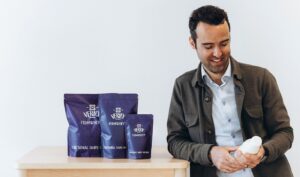What if technology could pinpoint the best-tasting cup of coffee without a human ever having to take a sip?
As the coffee industry expands, consumers are more curious than ever about different flavor profiles. For a market projected to hit $450 billion in value within the next couple of years, brewing up a better understanding of flavor is an alluring concept. AI-powered platform Demetria is hoping to offer just that.
“We call it the ‘wine-ification’ of coffee,” Felipe Ayerbe, president and co-founder of Demetria, told AFN.
“The most important characteristic of coffee is taste and the only way you can assess that is through doing a taste test, which is called cupping. Because this is the only way to assess coffee, it’s very exclusive, expensive, and time-consuming. A huge part of the value chain has no access to this process.”
The startup — which has offices in Colombia and Israel — came out of stealth today with a $3 million seed funding led by Israel and Latin America-focused investor Celeritas and a handful of other backers including Mercantil Colpatria, the investment branch of Colombian financial services player Grupo Colpatria.
Demetria claims to offer the world’s first data cloud to identify and track coffee quality with “complete traceability.” Using a near-infrared sensor, it analyzes a ‘green’ (yet to be roasted) coffee bean’s ‘fingerprint’ for biochemical markers associated with taste. This sensory fingerprint is matched on each bean profile according to the industry standard coffee flavor wheel.
“We can train the AI with information from cupping to actually detect the taste in green coffee beans before they are actually roasted. We are correlating cupping with the spectral fingerprint to create the sensory fingerprint of coffee,” Ayerbe said.
Collaboration with Carcafe, coffee growers federation
Demetria is offering its product through a software-as-a-service model. It can be used at any point on the supply chain after completing a pilot with Carcafe, the Colombian coffee division of Volcafe (itself part of ED&F Man, one of the world’s oldest and largest ag commodity traders.) Carcafe wants a distinct flavor profile for its coffee and tasked Demetria with building a matchmaking solution to find green beans that fit the bill.
“We are in the process of […] rolling out this groundbreaking technology to greatly increase the efficiency and effectiveness of our prospecting process, at our purchase points and in the field,” Sebastian Pinzón, general manager at Carcafe, said in a statement.
“Demetria replaces many manual processes to determine vital data that has previously been unavailable in the industry and is proving invaluable in making better decisions.”
Demetria is also working with the Colombian National Federation for Coffee Growers to develop a series of apps that help farmers and their transaction points in the supply chain keep track of bean quality and price their produce accordingly.
The momentum is encouraging for Ayerbe, who initially met with skepticism about his company’s core technology.
“They couldn’t believe that we could actually taste coffee without tasting it,” he said. “Now that we have a proven concept, it is a little bit mind-blowing in terms of the realm of possibilities, which is extensive. We have trouble deciding who to work with because every potential client says, ‘This is the future, we want to work with you.'”
‘Once you measure it, you can manage it’
Demetria’s attempt to replace cupping will bring benefits to both farmers and downstream stakeholders, according to Ayerbe. Cupping involves brewing a batch of coffee from green beans so that experts can sip it and identify a flavor profile based on metrics like acidity, sweetness, mouthfeel, and aftertaste. As a result, roasters and traders don’t get much of a grasp on the quality of the beans they’re buying until very late in the process.
“A roaster sitting in Europe does not have downstream visibility into quality. They only know what quality they are going to get from a particular harvest once it is in their warehouse and they are actually able to cup it,” Ayerbe said.
Further complicating the process is the fact that cupping isn’t available to the 12.5 million smallholder farmers who are responsible for producing 60% of the world’s coffee bean supply. Without the ability to guarantee a consistent quality level in their crop, the farmers’ incomes suffer. Beans are not tested until further down the supply chain after middlemen like traders, processors, and exporters take their cut.
As a result, coffee farmers receive only 2.5% of the profits on average from a cup of coffee sold to the end consumer.
“Once you can measure it, you can manage it,” Ayerbe said. “So we are also extending these apps to the farmer level so they can control their quality and understand what they are producing. We are solving a very structural issue in the value chain.”
Other startups bringing tech solutions to the coffee industry include Denmark’s Kaffe Bueno, which uses upcycled coffee grounds to make functional food ingredients; while US-based Atomo produces ‘molecular coffee’ by reverse-engineering the compounds responsible for the beverage’s flavor profile from a range of alternative plant sources.





